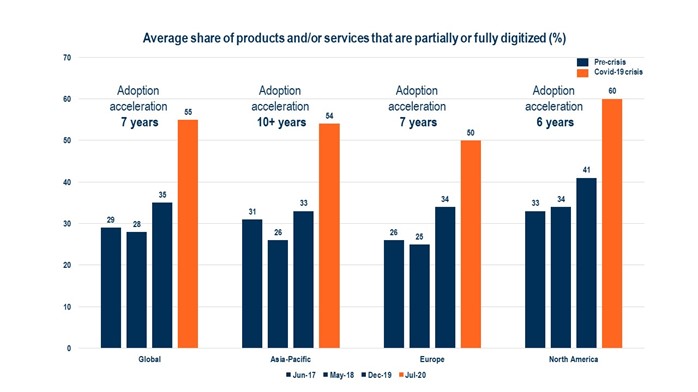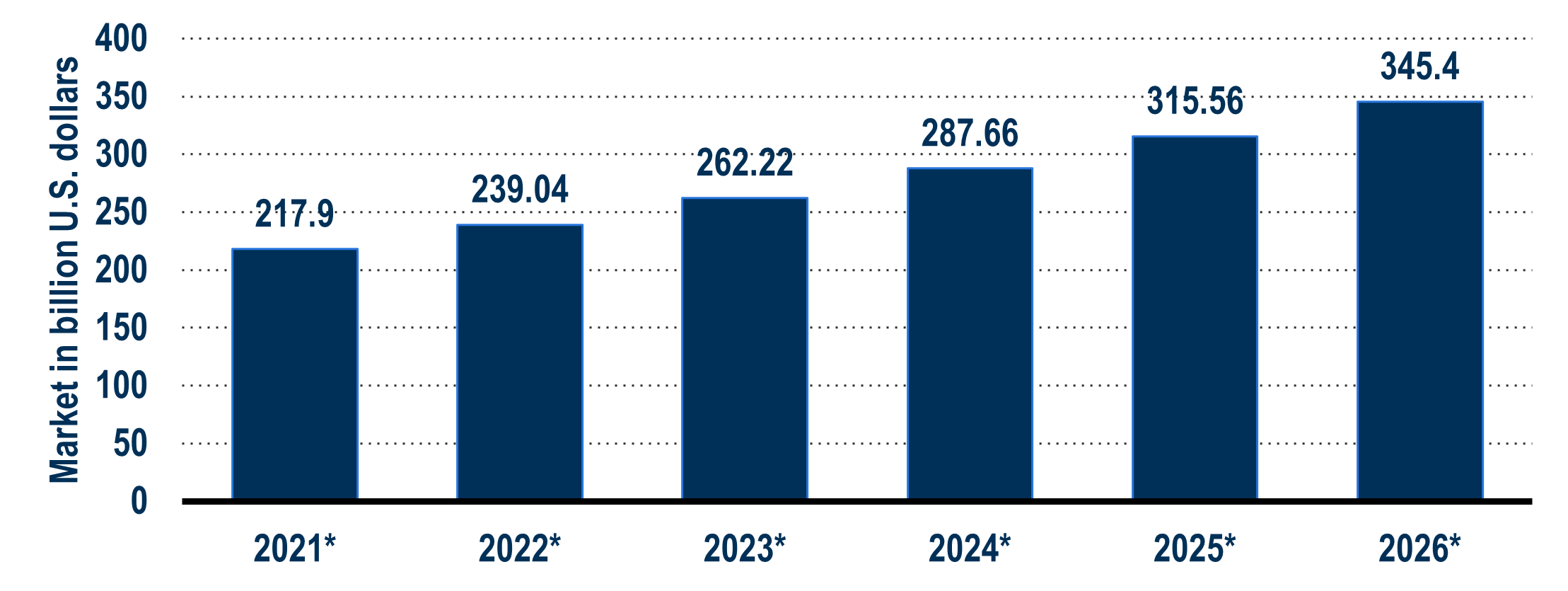“Digital adoption curves aren’t slowing down”
The pandemic propelled us all online as companies rapidly went digital in response to global shutdowns and ‘stay at home’ orders.
Although pre-Covid, the digital paradigm shift was already underway, we saw the pandemic serve as an accelerant across industries bringing about years of structural change within a few months.
As the chart below highlights, on average the pandemic accelerated long-term digital adoption trends by seven years in a matter of months:

Source: McKinsey 2021
As we emerge from the pandemic to a ‘new normal’, the role of the digital experience in our lives is front and centre, and this trend is showing no sign of slowing down in fact it’s continuing to build momentum.
As Satya Nadella, CEO of Microsoft, highlighted a year on from the start of the pandemic, “digital adoption curves aren't slowing down. They're accelerating, and it's just the beginning."
With the evolution of digital presence disrupting already disrupting industries, notably ecommerce, telemedicine, streaming video and remote learning.
It's hard to imagine how this rapid shift to digitalisation could have taken place without the infrastructure of the Cloud, especially if it hadn’t been secure.
The transparency, reliability, compliance, scalability of cloud computing allowed companies of all sizes to rapidly implement digital solutions providing much needed business continuity.
“People didn’t want the power station: they wanted the light.”
The power of technology, as a revolutionary force, occurs when there is a fundamental breakthrough not in the technology itself but the possibility and disruption the technology unlocks.
We are standing on the brink of a digital technological revolution that will likely fundamentally change the way we live, work and interact with each other. What makes cloud computing adoption significant is that it marks a paradigm shift in our relationship with the technology: the era of computing as a utility.
This represents the largest single change to computer access, tantamount to the industrial revolution for the digital age. The industrial revolution was powered by utilities, in this case water and steam, to mechanise production. Similarly, the second industrial revolution was fuelled by electricity, enabling mass production. Effectively, when industrial powerhouses were able to get electricity, water and gas exactly when they needed it in the quantities they needed (and only the quantities they needed), they could thrive. Utility is the again the game changer, except this time it’s cloud computing which is providing “industry” with what it needs at a time when it needs it.
We’re seeing the rapid adoption of cloud computing continue post-pandemic, with the latest forecasts from Gartner predicting global spending on cloud services to reach over $482 billion in 2022, up from $313 billion in 20201. Leaders in every industry are realising that they risk extinction by failing to migrate to the Cloud and as a consequence, investment in cloud services has become investment by necessity, meaning the average company now aspires to have cloud spend represent 80% of its total IT-hosting budget by 20242.
“Every company is becoming a software company”
In the face of market uncertainty utilities tend to be a defensive play – even in macroeconomic downturns people need electricity, running water, sanitation etc.
As we move to an increasingly digital world, these necessities are expanding to include cloud computing, wireless technology, and by extension – cybersecurity.
Companies at the forefront of cloud computing, by providing digital services are thus highly scalable and also so essential to today’s economy that they have effectively become digital utilities. Not to mention, the monopolistic business models of the biggest players in the space – with their near unsurpassable barriers to entry, vast pricing power and wide economic moats.
Cloud has evolved to become a driving force for business transformation via its fast and adaptable scalability, expanded speed to market and its continuous innovation.
Companies like Microsoft, Amazon and IBM are also expanding their hybrid offerings – combining both public and private cloud solutions to provide businesses with a more tailored and flexible option.
Businesses are also able to adopt a ‘multi-cloud’ approach – using a number of cloud services to again provide a more flexible cloud computing solution. Similarly, both old and new companies continue to innovate.
In databasing, for example, companies like Oracle and MongoDB are leading the charge to digitise databases, and transitioning to providing a database ‘as-a-service’ model.
The New Digital Utilities
So what makes a company so essential that it becomes a utility? A utility enables businesses to align expenditure with requirements, provides basic amenities for daily living, and tends to have a monopolistic share of the market.
Today, cloud infrastructure-as-a-service (“IaaS”), software-as-a-service (“SaaS”) and platform-as-a-service (“Paas”) companies are fast becoming the utilities of the digital age. That seem a reach? Imagine your company announces tomorrow that it plans to replace Microsoft, losing not only its vast cloud infrastructure – but Teams, Outlook, Excel…?
We’re seeing businesses not only investing in cloud solutions as part of their critical expenditure but turning to cloud computing companies to provide vital infrastructure, software and platform services.
Let’s look at one of the biggest companies in the world, Apple, as an example. With its pipeline of new products and services, why doesn’t Apple produce its own water, or electricity?
A fairly redundant point, it would cost the company far more in capex for this undertaking, than it would hope to recoup in costs. But what about cloud computing?
Although Apple manages many of its own data centres, it still heavily relies on third-party cloud companies.
Apple’s expenditure on Google Cloud services has increased 50% YoY with the company forecast to spend $300m this year alone3.
This highlights that even one of the biggest companies in the world has cloud service needs that are better served by a cloud service provider than by using its own.
This from a company with its own cloud infrastructure, so imagine the use cases for the majority of businesses for which this isn’t the case.
Another interesting ‘cloud as a utility’ example is Facebook, the company relies on Arista Networks for its data centres. As Facebook, one of Arista’s largest customers, amps up its capex by over 60% in 2022 to build out the metaverse, Arista is forecasting corresponding revenue growth of 30% for FY22.4
“Cybersecurity is the number one threat facing business today”
The rapid adoption of cloud computing has also heightened the need to ensure the security of this data. With the massive increase in digital presence for companies and consumers alike, cybersecurity has become a necessary investment for businesses.
This alongside the increase in number and sophistication of cyberattacks has led more leaders to label cybersecurity as the number one threat facing businesses.
2020 may well be remembered as a defining year for the industry with a 150% increase in cyberattacks, culminating in the SolarWinds hack (an attack that infiltrated US government agencies and organisations at a magnitude not seen before)5.
We’ve already seen the number of data breaches in 2021 outstrip 2020, putting 2021 on track for another record year.6
It comes as no surprise that in just one year we have seen the World Economic Forum raise Cybersecurity failures from the 7th to the 4th highest risk, globally.
With the predicted cumulative cybersecurity spend already forecast to be over $1.6 trillion between 2021 and 2026 (see chart below), companies at the forefront of the cybersecurity industry are joining cloud computing providers as the digital utilities of today.
If you were CEO/CFO today, what would it take for you to stop, or even lower, your cybersecurity expenditure?7
Size of the cybersecurity market worldwide from 2021 to 2026 (in billion U.S. dollars)

Digital vs Physical
With supply chain constraints now even hitting the tech giants like Apple and Amazon, the power of being digital is even more evident. Companies at the forefront of the digitalisation curve are less dependent on physical components, as well as the significant, expensive, infrastructure that traditional utility models are often reliant on.
A cloud or cybersecurity company wanting to expand its customer base, providing that next website hit, minute of streaming, software licence etc. requires significantly less capital expenditure when the product is cloud-based, than say a physical bicycle. In short, the scalability and margin for these companies is vast.
With the rapid adoption of cloud computing we’ve highlighted that investment in cloud services and, by extension cybersecurity, is now a necessity. We believe in the advantages of a theme-based approach; offering investors low cost, pure play exposure to companies at the forefront of these megatrends.
Sources:
[1] Source: Gartner, 2021.
[2] Source: McKinsey, 2021.
[3] Source: The Information, 2021.
[4] Source: Arista Networks Earnings Call.
[5] Source: CTA, 2021
[6] Source: Identity Theft Resource Center, 2021.
[7] Source : Statista, 2021.
References to specific companies should not be construed as a recommendation to buy or sell shares or other financial instruments issued by those companies, and neither should they be assumed profitable. You should consider the fund’s investment objectives, risks, and charges and expenses carefully before investing.
01/24/2022
Swiss Fund & Finance Platform




